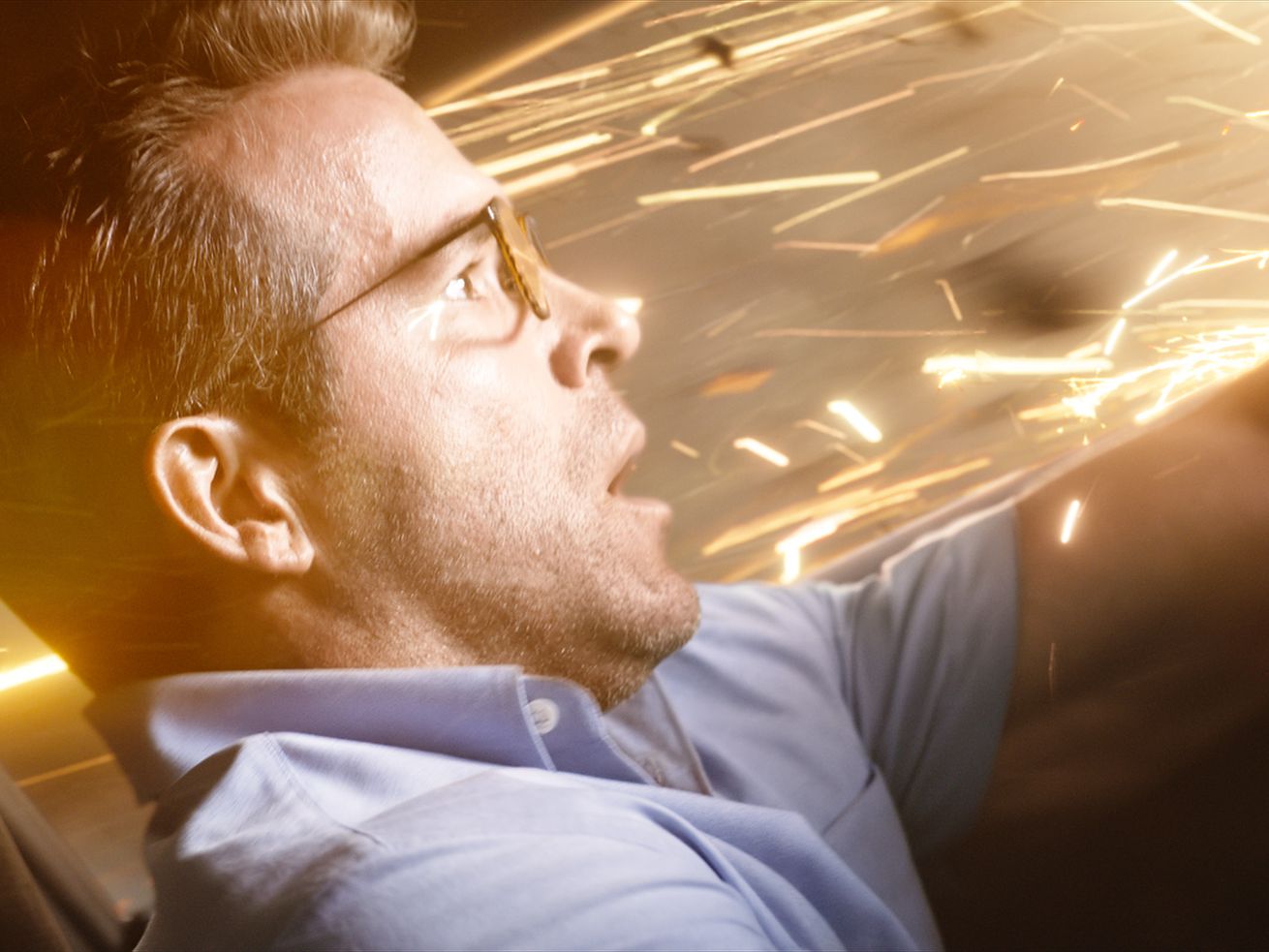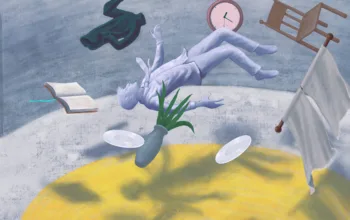Free Guy is about a man stuck in a fake world. Hollywood loves that metaphor.
Guy thinks his world is perfect. “My name is Guy, and I live in paradise,” he says in the early moments of Free Guy, by way of introduction. His days are unchanging: Greet his goldfish, raise the blinds, eat breakfast while watching the news, head off to work. Pick up coffee on the way — cream and two sugars, always — and crack some corny joke with the barista. Meet up with his friend Buddy. Settle in for another day as a bank teller.
Guy technically lives in Free City, which, to the outsider’s eye, is obviously not paradise. Cars are constantly crashing on the streets. People are routinely shot; buildings explode; fights break out. The bank where Guy works gets robbed every day, like clockwork.
But he thinks it’s perfect, because he is programmed to think it’s perfect. Guy (played by Ryan Reynolds) is a character in an open-world video game called Free City — think The Sims crossed with Grand Theft Auto. He and Buddy (Lil Rel Howery) are “non-playing characters,” which is a term for the bystanders and extras who mill about in the background, getting run over or shot or otherwise disregarded by the people actually playing the game.
Free Guy is the tale of Guy becoming self-aware, realizing that he can, and should, make choices in life. That’s partly thanks to some artificial intelligence code buried in his virtual DNA by Millie (Jodie Comer) and Keys (Joe Keery), and partly thanks to the existentialist philosophy of the movie he’s in. Let’s put it this way: Guy is not the only character in the film who needs to learn to take responsibility for his life and his choices.
/cdn.vox-cdn.com/uploads/chorus_asset/file/22778106/DF_29489_R.jpg) Alan Markfield/20th Century Studios
Alan Markfield/20th Century StudiosI quite enjoyed Free Guy, an original comedy with some good jokes and a bunch of funny performances. (In addition to the main cast, the film boasts Taika Waititi as the punky, petulant boy-man who runs the video game company that produces Free City, plus a few great cameos I won’t spoil.) Reynolds plasters over his occasionally too-knowing handsomeness with an utterly guileless affect, turning Guy into an accidental hero you want to see win. It’s a silly story, but it’s fun, and it’s inspiring in the manner of a TikTok video about how you can change your life if you just work hard.
That is probably why I spent most of Free Guy distracted by all the ways it reminded me of other movies with a similar existential bent. The film that Free Guy most recalls is The Truman Show, the 1998 Jim Carrey vehicle that holds up brilliantly as a precursor to the reality TV age. Carrey plays Truman Burbank, a man who was raised in a giant bubble and has no idea that his entire life is actually highly produced fiction, his every moment broadcast to the world. Truman’s life changes when he starts to realize something is fishy, and he wonders if he can break out of the construct and find his own way, even against the will of the show’s creator.
Though it’s probably the most well-known, The Truman Show is only one of many movies where a character realizing they’re being controlled — their steps preordained by some force bigger than them — becomes a larger meditation on the meaning of life, fate, chance, and destiny. In the 2006 comedy Stranger Than Fiction, Harold Crick (Will Ferrell) becomes slowly aware that he might actually be a character in a book, and consumes himself with trying to change his fate. In David Fincher’s 1997 thriller The Game, a wealthy investment banker (played by Michael Douglas) feels the border blurring between reality and a high-stakes “game,” and he’s not sure whether he’s in charge of his own life. In the 2011 sci-fi thriller Source Code, a fighter pilot finds himself enmeshed in a reality that he didn’t choose, and he doesn’t know if there’s any way out.
There are dozens more examples, most of which seem designed to prompt the audience to examine their assumptions, stop feeling “stuck,” and start living. They’re the modern-day reincarnation of the existentialist tradition stretching back to the late 19th century, drawing on figures like Kierkegaard and Sartre. Give life meaning by making deliberate choices, then take responsibility for those choices, they exhort. It’s an old, appealing philosophy, albeit one that tends to downplay factors outside of people’s control.
/cdn.vox-cdn.com/uploads/chorus_asset/file/22778111/DF_20703.jpg) Alan Markfield/20th Century Studios
Alan Markfield/20th Century StudiosI find it darkly ironic that existentially inclined movies often strand their characters in what amounts to a simulation of life — a video game, a reality TV show, a real-life role-playing game. After all, when you make a (fiction) movie, you are kind of doing the same thing. The characters are controlled by the filmmakers and the people who portray them; they exist only within the movie’s constructed world. It’s not a huge leap to wondering if you, too, are a character in someone else’s simulation of life, and thinking about it too long will twist you up in knots.
Free Guy raises some other surprisingly deep questions about the nature of being, too. For instance, if we develop self-aware artificial intelligence, and then decide to delete the code that powers them, does that mean we’ve killed off a being? If so, does that imply that intelligence is the fundamental measure of being? And if our answer to that question is yes, what are the implications for how we value human life? Dark but important stuff.
It’s more germane to wonder why we tell these stories at all. I have one theory, which is depressing but hard to resist: that we’ve all been slowly constructing our own simulations. We document our lives on social media, performing for followers. We gamify our lives, turning fitness and hydration and sleep quality into contests using tiny computers we carry in our pockets or strap onto our wrists. We buy things that algorithms tell us to buy. We may feel, little by little, that we’re ceding control to something outside of us — probably a corporation. So it’s not surprising that movies reflect that anxiety.
But when you’re worn down, it’s hard to imagine choosing any path other than the one of least resistance. That’s likely why the cheery conclusion of Free Guy is that we don’t just need to take charge of our own lives; if we want to save our world from becoming like Free City, we need to resist the people who try to construct our realities for us and find a way to live outside their grasp (or at least find a better way to live). It’s a strong message, and a relevant one. I just don’t know how real — or realistic — it is.
Free Guy opens in theaters on August 13.
Author: Alissa Wilkinson
Read More



